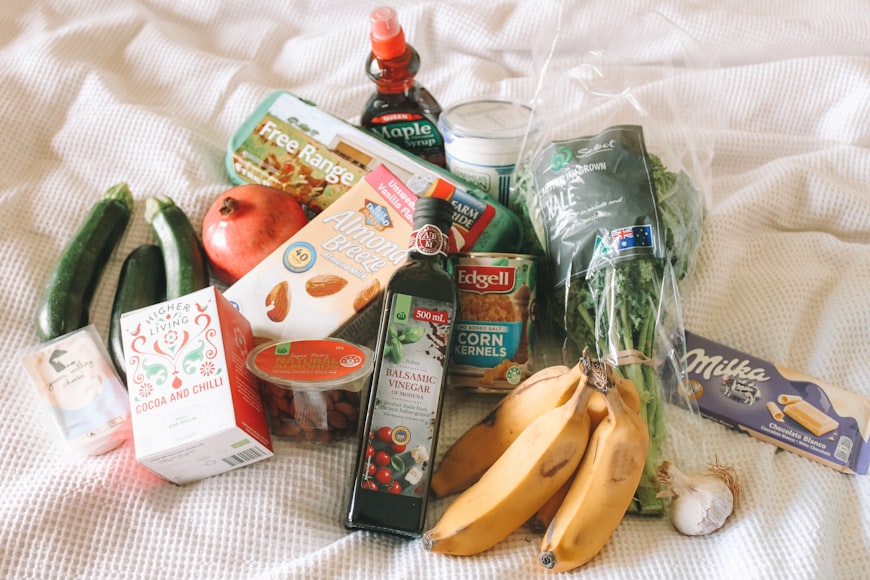7+ Proven Tips for Saving Money on Your Grocery Bill
Last updated: Apr 30, 2023

Cut your grocery bill without sacrificing quality meals. Our 10 proven tips show you how to shop strategically, meal plan, use coupons, and more. Start saving today!
Introduction
It's no secret that grocery shopping can quickly add up, leaving you with a hefty bill at the end of each trip. In today's world, where expenses are constantly increasing, it's essential to find ways to save money wherever possible. One of the easiest ways to do this is by implementing simple money-saving tips when shopping for groceries.
Many people make common mistakes when it comes to grocery shopping, and these mistakes can lead to overspending and waste. It's crucial to recognize these mistakes to avoid them and to save money in the long run. By doing so, you can free up some cash that you can use for other important expenses or savings.
In this article, we'll discuss the importance of saving money on your grocery bill and common mistakes people make when shopping for groceries. We'll also provide you with ten proven tips that can help you save money on your grocery bill. By following these tips, you can learn how to shop smart and reduce your grocery bill without sacrificing the quality of your meals.
1. Keep Track of Prices of Goods
It's essential to keep track of prices when shopping for groceries. Prices of goods can vary depending on the store, location, and even the time of year.
By keeping track of prices, you can easily identify when a product is on sale or when it's being sold at a higher price than usual. This way, you can make informed decisions on when to purchase certain items and when to wait for a better deal.
One of the easiest ways to keep track of prices is by keeping a price book. A price book is a list of items you purchase regularly and their prices at various stores.
You can keep this book in a physical notebook or create a spreadsheet on your computer or phone. By recording prices regularly, you can easily compare prices and identify the best deals.
It's not uncommon for stores to advertise products as "on sale" or "discounted" when they're not actually cheaper than their usual price.
It's a psychological effect that companies use called Anchoring Effect, all to make you buy more.
To determine if something is genuinely on discount, you should compare the current price to the price you've recorded in your price book.
This way, you can verify if the sale price is genuinely a deal or just a marketing tactic. Additionally, it's important to consider the quantity of the product being sold as a bundle, as sometimes the unit price can be higher in such cases.
By keeping track of prices and determining genuine discounts, you can save money on groceries and ensure you're not being tricked into spending more than you should.
2. Buy in Bulk
Buying in bulk can offer a range of advantages, including significant cost savings, less packaging waste, and the convenience of having a larger quantity of a product on hand. When buying in bulk, you can often (but not always) find products at a lower price per unit than you would when buying in smaller quantities.
However, there are also some disadvantages to buying in bulk that you should consider. For example, buying in bulk can require a larger initial investment of money. This can lock in your capital and prevent you from using that money for other savings goals or expenses.
Additionally, buying in bulk may not necessarily save you money in the long run if you end up throwing away unused food that has gone bad.
To avoid wasting food when buying in bulk, it's important to plan ahead and only purchase the quantities you know you'll use.
You can also consider sharing bulk purchases with friends or family members to split the cost and ensure that the food is consumed before it goes bad.
Another downside to buying in bulk is that it may require more storage space. If you don't have enough space to store your bulk purchases, it can be difficult to take advantage of the cost savings.
Overall, buying in bulk can be a great way to save money on your grocery bill, but it's important to be mindful of the potential drawbacks and take steps to avoid wasting food and tying up your finances.
By planning ahead and only purchasing the quantities you know you'll use, you can enjoy the benefits of buying in bulk while minimizing waste and maximizing your savings.
3. Limit Trips to the Grocery Store
Limiting trips to the grocery store is an effective way to save money on groceries. By reducing the frequency of your trips, you can lower the temptation to make impulse purchases and stick to your shopping list. Fewer trips to the store also mean less money spent on gas and other expenses associated with driving to the store.
To plan your trips to the grocery store effectively, you should start by taking an inventory of what you already have in your pantry and fridge. This way, you can determine what items you need to purchase and create a detailed shopping list. It's also important to consider the expiry dates of the products you have, so you can consume them before they go bad.
When planning your trip, try to choose a time when the store is less crowded to avoid long queues and delays. If possible, try to avoid shopping when you're hungry, as this can lead to impulsive purchases of food that may not be necessary.
Sticking to your shopping list is crucial when trying to save money on groceries. Impulse purchases can quickly add up, and before you know it, you're spending more money than you intended. If you're shopping with a partner or family member, ensure that they're aware of the shopping list and the importance of sticking to it.
By limiting trips to the grocery store, planning your trips effectively, and sticking to your shopping list, you can save money on groceries and reduce food waste.
Not only will this help you save money, but it can also help you to become a more conscious and responsible shopper.
4. Plan Your Meals
Meal planning is an essential aspect of saving money on groceries. By planning your meals, you can avoid the temptation to purchase food that you may not need, and also reduce food waste.
Additionally, meal planning can help you to eat healthier and maintain a balanced diet, as you can ensure that you're consuming a variety of nutrients and food groups.
It's also easier to track your calorie intake if you're looking to increase or decrease your weight.
To plan your meals, you should start by determining the number of meals you'll be cooking in a week, and the specific dishes you plan to prepare.
You can then create a shopping list based on the ingredients needed for each meal. It's essential to consider the expiry dates of the products you're purchasing, so you can use them before they go bad.
When planning your meals, try to incorporate seasonal produce, as they tend to be cheaper and more abundant.
Additionally, you can also plan to use leftovers from one meal to create another dish, reducing food waste and saving money.
Meal planning can save you money in several ways. Firstly, you can purchase ingredients in bulk, which is generally cheaper than buying them in smaller quantities.
Secondly, by planning your meals, you can avoid eating out or ordering takeout, which can be significantly more expensive. Finally, by planning your meals and reducing food waste, you can save money on groceries by not having to purchase as many items frequently.
By meal planning, you can save money on groceries while also maintaining a healthy and balanced diet. It may take some time to get used to, but it's an excellent habit to develop to reduce expenses and make smarter food choices.
5. Stock Up on Dry Foods and Long-Shelf Life Products
Stocking up on dry foods and long-shelf life products can be a great way to save money on groceries.
These items are usually cheaper and can be stored for extended periods without going bad. Additionally, these types of foods are versatile and can be used in many recipes, making them an excellent addition to your pantry.
There are several types of dry foods to consider stocking up on, including rice, pasta, lentils, and beans. These items are high in fiber and protein, making them a nutritious and filling addition to any meal.
Canned fruits and vegetables are also an excellent option, as they can be used in various recipes and have a long shelf life.
Other options include nuts, seeds, and dried fruits, which are excellent for snacking or as a topping for yogurt or oatmeal.
When purchasing dry foods, it's important to read the labels carefully and avoid products that contain added sugars, sodium, or preservatives. Opt for products that have minimal ingredients and are as natural as possible.
Spices can lose their taste over time, so keep that in mind. However, things like salt essentially last forever.
By stocking up on dry foods and long-shelf life products, you can save money on groceries while also ensuring that you have nutritious and versatile ingredients on hand for cooking. Additionally, by purchasing these items in bulk, you can save even more money in the long run.
6. Look for Coupons and Deals
Coupons and deals are a great way to save money on groceries. There are several places to find coupons, including newspapers, online coupon sites, and grocery store apps.
Many grocery stores also offer weekly deals, such as buy-one-get-one-free promotions or discounts on specific items.
To use coupons and deals effectively, it's important to plan your shopping trip in advance. Look through the weekly ads and coupons to determine which products are on sale, and create a shopping list based on those items.
Additionally, many stores offer loyalty programs that provide additional discounts and rewards for frequent shoppers.
When using coupons, make sure to read the fine print carefully to ensure that you're meeting all the requirements. For example, some coupons may have a minimum purchase amount, or may only be valid for certain products or brands.
If you also buy things online, an extension like Honey may be an option. However, it doesn't always provide the best coupons, but sometimes it does.
It can be challenging to avoid impulse purchases, especially when there are tempting deals and promotions.
One effective strategy is to procrastinate buying the item, reminding yourself that saving money is just procrastinated spending.
It's also essential to stick to your shopping list and avoid browsing aisles that don't have items on your list.
Additionally, when considering purchasing a product That's most likely not a grocery item.), you can use a calculator to determine if it's worth the cost.
By looking for coupons and deals, you can save money on groceries without compromising on the quality of the products you're purchasing.
By using these tips and tricks, you can make the most out of your grocery budget and enjoy delicious meals without breaking the bank.
7. Buy Generic Brands
Buying generic brands is a smart way to save money on groceries. In most cases, generic brands are just as good as their name-brand counterparts but are available at a lower cost.
Generic brands are often produced by the same manufacturers as name-brand products but sold under a different label.
Companies try to maximize their profits and often create recognized brands with attractive packaging to entice consumers to spend more money, even if there is no added value.
On the other hand, generic brands may sometimes have less appealing packaging to attract budget-conscious consumers.
By purchasing generic brands, you can save a significant amount of money on your grocery bill while still getting high-quality products.
In some cases, generic brands may even be healthier than name-brand products since they may contain fewer preservatives or additives.
However, there are some disadvantages to buying generic brands. For example, some generic products may have a different taste or texture than their name-brand counterparts.
Additionally, some generic brands may not be as widely available, making it harder to find the products you need.
To find high-quality generic brands, start by looking at the ingredient list. Make sure that the generic product contains the same key ingredients as the name-brand product. Additionally, look for generic brands that have positive reviews from other shoppers.
You can also try different generic brands and compare them to name-brand products to find which ones you like the best. By experimenting with different products, you can find high-quality generic brands that meet your needs and taste preferences.
In conclusion, buying generic brands is an effective way to save money on groceries without compromising on the quality of the products you're purchasing.
With a little bit of research and experimentation, you can find high-quality generic brands that meet your needs and taste preferences.
8. Shop Seasonally and Locally
Shopping seasonally and locally is a great way to save money on your grocery bill while also supporting your local community.
By shopping for fruits and vegetables that are in season, you can save money since they are more readily available and don't have to be shipped long distances.
Additionally, shopping at local farmers markets can help support small businesses and farmers in your area. Not only does this help the local economy, but it also helps reduce your carbon footprint since the produce doesn't have to be transported long distances.
To find local farmers markets, start by doing a quick search online or asking around in your community.
Many cities and towns have farmers markets that are held on a regular basis, so you can find fresh and seasonal produce all year round.
You can also consider going to less conventional or uncommon stores. Their lack of emphasis on presentation or making products look appealing may mean that they have some cheap options available.
When shopping seasonally and locally, it's important to plan your meals around the produce that's available. This means being flexible with your menu and incorporating seasonal fruits and vegetables into your meals.
Additionally, you can save money by buying in bulk and freezing or canning excess produce. This way, you can enjoy fresh and seasonal produce all year round without having to pay a premium for out-of-season items.
Overall, shopping seasonally and locally is a smart way to save money on your grocery bill while also supporting your local community.
By incorporating seasonal produce into your meals and buying in bulk, you can enjoy fresh and healthy food while also being mindful of your budget.
Conclusion
Implementing the 10 proven tips for saving money on your grocery bill can make a significant difference in your monthly expenses.
To recap, these tips include keeping track of prices, buying in bulk, limiting trips to the grocery store, meal planning, stocking up on dry foods, using coupons and deals, buying generic brands, and shopping seasonally and locally.
It's important to implement these tips because grocery expenses can add up quickly, especially if you're not mindful of your spending habits.
By taking the time to plan your meals, shop smart, and take advantage of deals and discounts, you can significantly reduce your grocery bill without sacrificing the quality of your food.
Saving money on your grocery bill also has long-term benefits for your financial health.
By reducing your monthly expenses, you can free up more money to invest in your future or pay off debt.
Additionally, by developing smart shopping habits, you can create a sustainable budget that will help you save money in the long run.
In conclusion, by implementing these 10 proven tips for saving money on your grocery bill, you can enjoy fresh and healthy food while also being mindful of your budget.
By shopping smart and planning ahead, you can significantly reduce your monthly expenses and improve your financial health in the long run.










